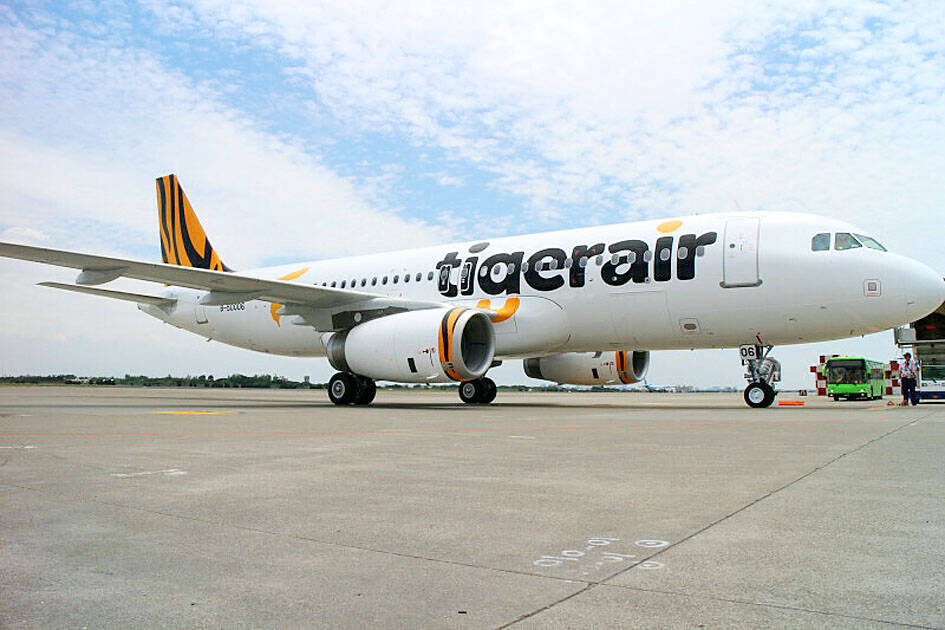Budget airline Tigerair Taiwan Ltd (台灣虎航) yesterday said it would give year-end bonuses to employees equivalent to an average of 12.5 months of salary for the upcoming Lunar New Year holiday, marking the highest year-end bonuses ever offered by an airline.
The airline also announced that it would offer a fixed monthly salary increase of NT$3,000 (US$90.99) to all employees, with an average salary raise of 4 percent for this year, a record high salary increase in the airline industry.
This year, median year-end bonus for employees will be an average of 12.8 months of salary, with some to get up to 17.4 months of salary, which is higher than the average 10.8 months of salary for year-end bonuses the airline offered last year, Tigerair said in a statement.

Photo courtesy of Tigerair Taiwan Ltd
The year-end bonus was decided on after taking into consideration the efforts made by all employees last year and the company’s record operating performance, Tigerair said.
This year marks the 11th anniversary of the airline’s operation, with the routes it operates covering major cities and areas in Japan, South Korea, Macau, Thailand and Vietnam.
The company turned a profit in a short time after the reopening of international borders following three years of travel restrictions imposed from 2020 due to the COVID-19 pandemic, according to the statement.
In Taiwan, employers typically issue year-end bonuses before the Lunar New Year holiday, which starts on Jan. 25 this year and runs through Feb. 2.
In November last year, Tigerair paid an average of three months’ basic salary plus a fixed amount of NT$20,000 as a mid-year bonus for all employees.

UNCERTAINTY: Innolux activated a stringent supply chain management mechanism, as it did during the COVID-19 pandemic, to ensure optimal inventory levels for customers Flat-panel display makers AUO Corp (友達) and Innolux Corp (群創) yesterday said that about 12 to 20 percent of their display business is at risk of potential US tariffs and that they would relocate production or shipment destinations to mitigate the levies’ effects. US tariffs would have a direct impact of US$200 million on AUO’s revenue, company chairman Paul Peng (彭雙浪) told reporters on the sidelines of the Touch Taiwan trade show in Taipei yesterday. That would make up about 12 percent of the company’s overall revenue. To cope with the tariff uncertainty, AUO plans to allocate its production to manufacturing facilities in

TAKING STOCK: A Taiwanese cookware firm in Vietnam urged customers to assess inventory or place orders early so shipments can reach the US while tariffs are paused Taiwanese businesses in Vietnam are exploring alternatives after the White House imposed a 46 percent import duty on Vietnamese goods, following US President Donald Trump’s announcement of “reciprocal” tariffs on the US’ trading partners. Lo Shih-liang (羅世良), chairman of Brico Industry Co (裕茂工業), a Taiwanese company that manufactures cast iron cookware and stove components in Vietnam, said that more than 40 percent of his business was tied to the US market, describing the constant US policy shifts as an emotional roller coaster. “I work during the day and stay up all night watching the news. I’ve been following US news until 3am

Taiwan will prioritize the development of silicon photonics by taking advantage of its strength in the semiconductor industry to build another shield to protect the local economy, National Development Council (NDC) Minister Paul Liu (劉鏡清) said yesterday. Speaking at a meeting of the legislature’s Economics Committee, Liu said Taiwan already has the artificial intelligence (AI) industry as a shield, after the semiconductor industry, to safeguard the country, and is looking at new unique fields to build more economic shields. While Taiwan will further strengthen its existing shields, over the longer term, the country is determined to focus on such potential segments as

COLLABORATION: Given Taiwan’s key position in global supply chains, the US firm is discussing strategies with local partners and clients to deal with global uncertainties Advanced Micro Devices Inc (AMD) yesterday said it is meeting with local ecosystem partners, including Taiwan Semiconductor Manufacturing Co (TSMC, 台積電), to discuss strategies, including long-term manufacturing, to navigate uncertainties such as US tariffs, as Taiwan occupies an important position in global supply chains. AMD chief executive officer Lisa Su (蘇姿丰) told reporters that Taiwan is an important part of the chip designer’s ecosystem and she is discussing with partners and customers in Taiwan to forge strong collaborations on different areas during this critical period. AMD has just become the first artificial-intelligence (AI) server chip customer of TSMC to utilize its advanced